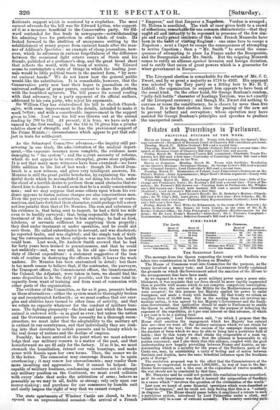As the Sebastopol Committee advances,—the inquiry still per- severing in
one track, the admLnistration of the medical depart- ment,—the exposure becomes more complete, the evidence more damaging to "the system " ; and the u:gent necessity of reforms, which do not appear to be even attempte4, grows more palpable. It is not that many more witnesses have been examjned—we have little addition to the list of last week : though Br. David Dum- breck is a new witness, and gives very intelligent answers, Dr. Menzies is still the great public benefactor, by explaining the won- derful deeds which he accomplished in not doing his duties, under the cloud of a terrible desire to perform them amid obstacles that re- duced him to despair. It would seem that be is a really conscientious man; and we may suppose that some others upon whom his evi- dence appears to fasten serious charges are also conscientious men. Even the purveyors and contractors, who are negligent or contu- macious, and have forfeited their character, could perhaps tell a story not less painful than that of Dr. Menzies. The sum and substance of his evidence is, that being sent to inspect, he had a field too wide even to be hastily surveyed ; that, being responsible for the proper treatment of the sick, they came to him starving; he had no food, kitchens, or servants sufficient for supplying them properly; they died under treatment or under operation, and he could not save them. He called subordinates to account, and was disobeyed; he reported faults, and was slighted; and the simple task of writ- ing the correspondence on these subjects was more than his health could bear. Last week, Dr. Andrew Smith avowed that he had for forty years been trained to penuriousness, and that he could not suddenly—and, we may add, in his old age—learn the new duty of liberal expenditure : a statement suggestive of the iron rule of routine in destroying the officers while it leaves the work undone. Dr. Menzies has been anatomized in detail; but there is too much reason to believe that, if the contractor, the purveyor, the Transport officer, the Commissariat officer, the Quartermaster, the Colonel, the Adjutant, were taken in turn, we should find the same disposition to do the duty if possible, and the same total in- capacity from want of training and from want of connexion with other parts of the organization.
The evidence of the Committee, so far as it goes, presents before us these alternatives—either the system must be thoroughly broken up and reconstructed forthwith-; or we must confess that our ener- gies and abilities have turned to other lines of activity, and that we retain no capacity whatever for the conduct of military busi- ness. The fighting propensity—the first and last which the human animal is endowed with—is as good as ever ; but unless the nation and the Government perceive the necessity for a thorough recon- struction, we must infer that the adaptability to the military art is extinct in our countrymen, and that individually they are sink- ing into that devotion to selfish pursuits and to luxury which is the real decay of nations and the decline of empires. Possibly, we have arrived at the point where we must acknow- ledge that our military renown is a matter of the past, and that henceforward we are fit only for the factory. If so it be, we must stomach the humiliation, retract our vain boastings, and make peace with Russia upon her own terms. Then, the sooner we do it the better. The concession may encourage Russia to be again overbearing ; it may renew her encroachments; may render them more insulting and aggressive. But it cannot be helped. In- capable of military business, condemning ourselves not to attempt any military position on the Continent, we must avoid collision with every state that seeks the arbitration of arms ; behave as peaceably as we may-to all, feeble or strong; rely only upon our money-making; and purchase for our commerce by humble snit and costly largess the right of way that we cannot compel


























 Previous page
Previous page